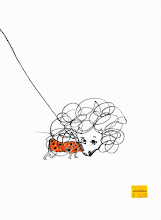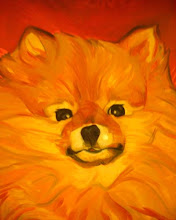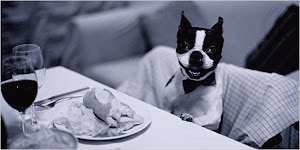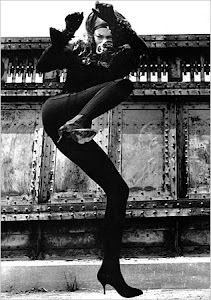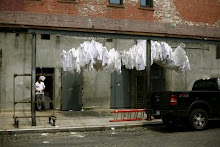Some books follow us around, dogging us, goading us to read them.
A long time ago I was in a similar state of romantic distress (when oh when will I learn??) and a good friend of mine recommended I read the entire output of Pema Chodron, a Buddhist nun. He was the religion ("ideas, opinions and beliefs") buyer for a major bookstore chain and he was always trying to get us to buy his stuff. I bought the books but didn't bother to read them, and took to drinking instead.
But here I am again. And again, Pema Chodron has come back to haunt me. Her book, The Places That Scare You, was recommended without reservation by a gentle reader, and this time I am accepting the prodding of fate. I am actually reading When Things Fall Apart, since they did, and I was heartened by a passage where Chodron says she was led to Buddhism through anger at her husband. She was sipping a nice cup of tea one day and he pulled into the driveway of their home, got out of the car, slammed the door and told her their relationship was over and he wanted a divorce. This sounds so strikingly similar to what happened to me (the drive-by shooting nature of the End, the sudden-ness and one-sidedness of it) that I thought, okay. Show me how you got over it.
I'll let you know.
Monday, January 22, 2007
Thursday, January 18, 2007
More what is the what
NYT's Michiko Kakutani calls What is the What by Dave Eggers "a startling act of literary ventriloquism" and this sums it up with typical brilliance. It is a wodge of incredible writing and better reporting on a point in one country's history when the unimaginable was everyday.
I am as yet just half way through this fine book (fie on Eggers for calling an inferior example "a heartbreaking work of staggering genius", I hope he regrets that), and our hero Valentino Achak Deng has just buried his childhood friend, a boy with whom he shared a crib, a village in Sudan, history. William K walked beside him on the trek to Ethiopia (what madness, frying pan to fire, or dirt desert to ... dirt desert) and on this day, William K simply sat down beside a tree, closed his eyes, and died. Others died more magnificently or certainly with more violence; this was a startling death for Achak in that it was so gentle a slipping away. And profound. "I could not remember more than a handful of those days that we had not been together, that I had not run with William K. We wre simply friends who lived in a village together and expected to always be boys and friends in our village." It does not seem to be an unreasonable expectation, certainly not an extravagant one.
Yet William K walked until all energy and life ebbed away. He did not reach the next place, neither Ethiopia nor adulthood. William K, we know, was a fabulist, he invented a rich and wonderful Ethiopia where the Sudanese were well-fed, could drink all the cool water a body could want, had power. His Ethiopia was magnificent. Maybe he had to die before he could die of disappointment.
I wonder what it takes to survive, why one body does and another doesn't. These two boys were born together and stood side by side, yet one died and one did not. Victor Frankl thought it was attitude, in a way, that saved some from death in concentration camps. William K had a very positive one, and so his death is all the more worrying....if hope, that magic element, doesn't help, my god think of the consequences.
As Achak says, "It was a broken world...that would allow a boy such as me to bury a boy such as William K."
I am as yet just half way through this fine book (fie on Eggers for calling an inferior example "a heartbreaking work of staggering genius", I hope he regrets that), and our hero Valentino Achak Deng has just buried his childhood friend, a boy with whom he shared a crib, a village in Sudan, history. William K walked beside him on the trek to Ethiopia (what madness, frying pan to fire, or dirt desert to ... dirt desert) and on this day, William K simply sat down beside a tree, closed his eyes, and died. Others died more magnificently or certainly with more violence; this was a startling death for Achak in that it was so gentle a slipping away. And profound. "I could not remember more than a handful of those days that we had not been together, that I had not run with William K. We wre simply friends who lived in a village together and expected to always be boys and friends in our village." It does not seem to be an unreasonable expectation, certainly not an extravagant one.
Yet William K walked until all energy and life ebbed away. He did not reach the next place, neither Ethiopia nor adulthood. William K, we know, was a fabulist, he invented a rich and wonderful Ethiopia where the Sudanese were well-fed, could drink all the cool water a body could want, had power. His Ethiopia was magnificent. Maybe he had to die before he could die of disappointment.
I wonder what it takes to survive, why one body does and another doesn't. These two boys were born together and stood side by side, yet one died and one did not. Victor Frankl thought it was attitude, in a way, that saved some from death in concentration camps. William K had a very positive one, and so his death is all the more worrying....if hope, that magic element, doesn't help, my god think of the consequences.
As Achak says, "It was a broken world...that would allow a boy such as me to bury a boy such as William K."
Tuesday, January 16, 2007
What? is the What??
Dave Eggers made a bit splash years ago with the quirky, cheeky and weird A Heartbreaking Work of Staggering Genius, the story of what happened next when Eggers' parents both died and he was left to care for his little brother. I was working in books retail at the time and this seemed to be the first of its kind, a post-modern but heartwrenching work of perhaps not staggering genius, but a kind of genius nonetheless. Lots of us didn't quite get it, and lots of us felt we ought to like it even though we didn't really and thought the diagrams were a bit much; nonetheless we supported this book and now we all know it went on to staggering sales and launched a career for Eggers in publishing and groundbreaking of all kinds.
The title should have been more of a tip-off than it was.
My first brush with Eggers the man was at the Horseshoe Tavern, a still-gritty bastion of what was arty Queen West in Toronto. It was an odd and perhaps courageous place to hold a book event, and maybe even tickets were sold. Unheard of. What ensued was not so much a reading as a performance, with Eggers, all adorable curls and pseudo-humility being the bratty smart ass and his friend (or a performer) riffing with him, dressed as a superhero, The Wolverine. Not much reading got done, or even talking -- it was more an SNL sketch than anything else and at the end, Eggers invited questions from the audience. Some brave souls obliged.
Eggers then "answered" with snide remarks and sarcasm, and most of us got the joke and resisted raising a hand. One man, though, persisted. He was older and stood up and asked a reasonable question. He asked Eggers how his family viewed the book, because in telling his own story he of course co-opted theirs, and what is this like, especially when one family member, the little brother, was so, well, little and thus possibly even more vulnerable than your average subject. Clearly this was a reasonable question asked by a man who not only had read the book but seemed genuinely curious about what the answer but be, and yet Eggers was relentless in his schtick. Made fun. Tossed off. The man persisted yet further, put the question another way, only to be shunted aside by The Wolverine and Bratty Dave. I hate to see book lovers mocked, ever, and certainly hate it when the mocker is the author himself. It was ugly.
I decided then never to buy another Eggers book, should there be one, and have never purchased McSweeneys or The Believer or any of his other apparently fabulous bits of publishing. I did almost bend the rule when I heard about his literacy organization in New York, where kids learn to love words and reading through their work at a superhero supply store (long story, but a good one).
However, I find myself unable to keep to my Eggers-free promise.
The NYT Book Review so raved about What is the What, it seemed we finally had a work of staggering genius (not the first time this lucky bastard will see THAT in print).
But that may not in itself have been enough.
However, I have had my heart broken and have been spinning inward and inward again, unable to lift my head some days. I wanted to read something about someone who had bigger problems than I do, just to take my mind off it.You will hear much more about What is the What from actual book critics who will tell you important things about this important book. It is a "novel" and an "autobiography" (this sliding around is typical po-mo and typical Eggers, no?) of one of the Lost Boys of the Sudan and it embarrasses me greatly to admit I was a reporter once, who covered actual news, and I knew nothing of this mass movement, this horrible bloodbath in the Sudan than left children enslaved, abandonned, or murdered, and I knew nothing of the tribe of young boys walking by foot to what they hoped would be the safety of Ethiopia. The carnage and evil is breathtaking, the everyday hardship, and the courage -- and luck -- of our hero profound.
The story thus far is told in a lilting, formal and yet poetic way. In a soulful way. In a way that is careful of language, trying not to say too much or overstate what surely must be tempting to embellish if only to satisfy a primal sense of rage over the atrocities children were forced to witness.
I am not yet finished this book. But yes, it is about someone whose problems are worse than mine. Who faced real carnage, not the casual betrayal I did. It has taken my mind off things. And turned it on to others.
The title should have been more of a tip-off than it was.
My first brush with Eggers the man was at the Horseshoe Tavern, a still-gritty bastion of what was arty Queen West in Toronto. It was an odd and perhaps courageous place to hold a book event, and maybe even tickets were sold. Unheard of. What ensued was not so much a reading as a performance, with Eggers, all adorable curls and pseudo-humility being the bratty smart ass and his friend (or a performer) riffing with him, dressed as a superhero, The Wolverine. Not much reading got done, or even talking -- it was more an SNL sketch than anything else and at the end, Eggers invited questions from the audience. Some brave souls obliged.
Eggers then "answered" with snide remarks and sarcasm, and most of us got the joke and resisted raising a hand. One man, though, persisted. He was older and stood up and asked a reasonable question. He asked Eggers how his family viewed the book, because in telling his own story he of course co-opted theirs, and what is this like, especially when one family member, the little brother, was so, well, little and thus possibly even more vulnerable than your average subject. Clearly this was a reasonable question asked by a man who not only had read the book but seemed genuinely curious about what the answer but be, and yet Eggers was relentless in his schtick. Made fun. Tossed off. The man persisted yet further, put the question another way, only to be shunted aside by The Wolverine and Bratty Dave. I hate to see book lovers mocked, ever, and certainly hate it when the mocker is the author himself. It was ugly.
I decided then never to buy another Eggers book, should there be one, and have never purchased McSweeneys or The Believer or any of his other apparently fabulous bits of publishing. I did almost bend the rule when I heard about his literacy organization in New York, where kids learn to love words and reading through their work at a superhero supply store (long story, but a good one).
However, I find myself unable to keep to my Eggers-free promise.
The NYT Book Review so raved about What is the What, it seemed we finally had a work of staggering genius (not the first time this lucky bastard will see THAT in print).
But that may not in itself have been enough.
However, I have had my heart broken and have been spinning inward and inward again, unable to lift my head some days. I wanted to read something about someone who had bigger problems than I do, just to take my mind off it.You will hear much more about What is the What from actual book critics who will tell you important things about this important book. It is a "novel" and an "autobiography" (this sliding around is typical po-mo and typical Eggers, no?) of one of the Lost Boys of the Sudan and it embarrasses me greatly to admit I was a reporter once, who covered actual news, and I knew nothing of this mass movement, this horrible bloodbath in the Sudan than left children enslaved, abandonned, or murdered, and I knew nothing of the tribe of young boys walking by foot to what they hoped would be the safety of Ethiopia. The carnage and evil is breathtaking, the everyday hardship, and the courage -- and luck -- of our hero profound.
The story thus far is told in a lilting, formal and yet poetic way. In a soulful way. In a way that is careful of language, trying not to say too much or overstate what surely must be tempting to embellish if only to satisfy a primal sense of rage over the atrocities children were forced to witness.
I am not yet finished this book. But yes, it is about someone whose problems are worse than mine. Who faced real carnage, not the casual betrayal I did. It has taken my mind off things. And turned it on to others.
Entre Nous. Every girl needs an inner French girl
It is used far too much but when you really look at it, really make the words mean what they might have the first time someone used what is now a cliche, "broken heart" is terribly descriptive. Something is broken, jangly, all sharp edges. Something essential is now detritus. Something isn't working anymore.
I'm too old for it but having my heart broken has left me untethered and unable to remember what used to interest me. Nothing does, much; not anymore. Some call this "losing the centre" and that's how it feels -- where there was once focus and comfort, a path and a long list of shared habits there is now....nothing. A blank. A blank that nonetheless hurts like hell.
My friends tell me the cure is to turn inside, though not in mourning. They mean return the focus from HIM to myself, they encourage all manner of pampering and indulgence. I used to say the same to them, when it was their turn to be in bits on the side of the road. Damn hard to do, though, when the "self" that was once loved and assumed lovable has been so summarily and peremptorily rejected. It's hard to get selfish when you wish your self would just go away.
But as in all things, there is a cure in a book. Not a typical self-help book though I cast no aspersion, there may be good ones out there. I have been reading, over and over again, Entre Nous. I have just recently felt a twinge of interest in releasing my own inner French girl. We all have one, let's face it.This little silly frivolous fun book is the doctor's orders. It tells of doing just what we must in this condition -- tend to our own garden, pull in a bit, don't give away so much. Be respectful of your own time and your own self -- body, spirit, mind. Dress better, take good care of your skin, nurture your interests and your mind, be a little mysterious. Know your own worth and make sure that any applicants for your time or good humour are worthy of your time, interest, energy. But mostly, nurture your mind and your soul. Become happy in your own skin. Don't give up solitude too easily. Learn to value yourself so much that you can spot a monster a mile away....because you really would rather spend time on your own than with someone not quite appreciative enough. Love yourself the way you wish he did.
Too crazy? Mad? Silly? It's working.
I'm too old for it but having my heart broken has left me untethered and unable to remember what used to interest me. Nothing does, much; not anymore. Some call this "losing the centre" and that's how it feels -- where there was once focus and comfort, a path and a long list of shared habits there is now....nothing. A blank. A blank that nonetheless hurts like hell.
My friends tell me the cure is to turn inside, though not in mourning. They mean return the focus from HIM to myself, they encourage all manner of pampering and indulgence. I used to say the same to them, when it was their turn to be in bits on the side of the road. Damn hard to do, though, when the "self" that was once loved and assumed lovable has been so summarily and peremptorily rejected. It's hard to get selfish when you wish your self would just go away.
But as in all things, there is a cure in a book. Not a typical self-help book though I cast no aspersion, there may be good ones out there. I have been reading, over and over again, Entre Nous. I have just recently felt a twinge of interest in releasing my own inner French girl. We all have one, let's face it.This little silly frivolous fun book is the doctor's orders. It tells of doing just what we must in this condition -- tend to our own garden, pull in a bit, don't give away so much. Be respectful of your own time and your own self -- body, spirit, mind. Dress better, take good care of your skin, nurture your interests and your mind, be a little mysterious. Know your own worth and make sure that any applicants for your time or good humour are worthy of your time, interest, energy. But mostly, nurture your mind and your soul. Become happy in your own skin. Don't give up solitude too easily. Learn to value yourself so much that you can spot a monster a mile away....because you really would rather spend time on your own than with someone not quite appreciative enough. Love yourself the way you wish he did.
Too crazy? Mad? Silly? It's working.
books for broken hearts
Reading has always been a solace and an escape-- but I’ve found even books now contain landmines. Since my baby left me I can’t bear anything that takes place in New York (where we lived) or London (where he is now) or any place in Britain for that matter (gone are Ruth Rendell et al, decent mysteries, all UK fiction) ; love is out (natch) and therefore gone is anything smart and sassy and all chick lit; and so too are books about writers (he is one and there is a plethora of these. “Write what you know” yes, but honest to god fiction means you get to make stuff up) reporters (he was one, and this means even movies are no distraction, Scoop is definitely out, The Devil Wears Prada iffy) So this leaves me pretty much with murder mysteries set in Chicago (if I skip over the bits where the heroine has a love interest/tussle) and children’s books. Happily, however, I have found a few good reads which will soothe an aching heart and if it not be aching, will at least entertain you.
How I Live Now is pegged as YA, a book for kids, but that sells it short. It is a story about children, yes, or rather "young adults" and alarmingly it is set in England but not an England any of us could possibly know -- it is a country of another time, embroiled in a nameless, amorphous war that takes all parents away and throws the children into a kind of chaos. The war makes no sense, the children are defenseless and struggling to survive, to figure it out, to find comfort if not joy; power fails, systems fail, rules fail. The story captures the creeping anxiety that The Painted Bird does, without being quite so brutal. So why read it? Because it is also beautiful, a story of survival which quite frankly hit the spot, because we all need to consider, in the age of terrorism (or terrible acts, per ex) "how I live now."
I have also been addicted to two books I blush to talk about -- Elegance, by Genevieve Antoine Dariaux and Entre Nous - A Woman's Guide to Finding Her Inner French Girl by Debra Ollivier. It is my theory that great books, or books we love, are a function of when we read them as much as their actual content. When you need it, there is nothing like The Fountainhead to stir you -- years later not so much. I am not proud of this but in my state of inner turmoil and sadness it is refreshing to read a how-to manual on being more French, and hopefully more alluring, as per Entre Nous; Elegance is a book on, well, elegance and how to attain it, or how a woman attained it in the late 1950's and early 60's. This is all about taking good care yourself, preserving inner peace, the remaking and remodeling of a self which in my case was left behind by a beloved. These books are fun but they are also a way back to centre when you are feeling too raw in the world -- both speak of discretion and looking after your own soul.
How I Live Now is pegged as YA, a book for kids, but that sells it short. It is a story about children, yes, or rather "young adults" and alarmingly it is set in England but not an England any of us could possibly know -- it is a country of another time, embroiled in a nameless, amorphous war that takes all parents away and throws the children into a kind of chaos. The war makes no sense, the children are defenseless and struggling to survive, to figure it out, to find comfort if not joy; power fails, systems fail, rules fail. The story captures the creeping anxiety that The Painted Bird does, without being quite so brutal. So why read it? Because it is also beautiful, a story of survival which quite frankly hit the spot, because we all need to consider, in the age of terrorism (or terrible acts, per ex) "how I live now."
I have also been addicted to two books I blush to talk about -- Elegance, by Genevieve Antoine Dariaux and Entre Nous - A Woman's Guide to Finding Her Inner French Girl by Debra Ollivier. It is my theory that great books, or books we love, are a function of when we read them as much as their actual content. When you need it, there is nothing like The Fountainhead to stir you -- years later not so much. I am not proud of this but in my state of inner turmoil and sadness it is refreshing to read a how-to manual on being more French, and hopefully more alluring, as per Entre Nous; Elegance is a book on, well, elegance and how to attain it, or how a woman attained it in the late 1950's and early 60's. This is all about taking good care yourself, preserving inner peace, the remaking and remodeling of a self which in my case was left behind by a beloved. These books are fun but they are also a way back to centre when you are feeling too raw in the world -- both speak of discretion and looking after your own soul.
Subscribe to:
Posts (Atom)
